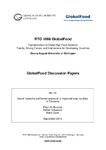| dc.description.abstract | In Sub-Sahara Africa, adoption rates of improved crop varieties remain relatively
low, which is partly due to farmers’ limited access to information. In smallholder settings,
information often spreads through informal networks. Better understanding of such networks
could potentially help to spur innovation and farmers’ exposure to new technologies. This
study uses survey data from Tanzania to analyze social networks and their role for the spread
of information about improved varieties of maize and sorghum. Regression models show that
network links for the exchange of agricultural information are more likely between farmers
who have similar educational but different wealth levels. Moreover, network links are more
likely when farmers have direct contacts to extension officers, suggesting that information
flows through informal channels can support but not replace formal channels. Social
networks play a significant role for the spread of information about open-pollinated varieties.
This is not the case for maize hybrids, which are sold by private seed companies. | en_US |

